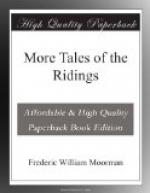“Shoo’s for sale,” he cried, “same as if shoo were a cauf; and shoo goes to t’ highest bidder.” A roar of laughter greeted these words, but nobody had the courage to make a bid. Seeing that purchasers held back, Learoyd after the manner of an auctioneer, proceeded to announce his stepdaughter’s “points.”
“Shoo’s a gradely lass, I tell you, for all shoo looks sae dowly. Shoo can bak an’ shoo can brew, and I’ve taen care that shoo’ll noan speyk while shoo’s spoken to.”
“If shoo can do all that,” asked a bystander, “why doesta want to sell her?”
The farmer eyed the questioner narrowly, and then, in a sullen voice, answered: “I’m sellin’ her because I want to get shut on her. Happen that’ll be reason enough for the likes o’ thee, Timothy.”
After more of this altercation one of the younger men, urged on by his comrades, summoned up courage to make a bid.
“Sithee, I’ll gie thee threepence for her, farmer.”
The girl, hearing the insulting offer that was made, raised her eyes for a moment to glance at the speaker, then shuddered, and, after a pleading look at her stepfather, lowered them again.
Learoyd, taking no notice of the girl, looked the bidder steadily in the face for a moment, in order to discover whether the offer was seriously made, and, apparently satisfied that such was not the case, replied: “I’ll noan sell her for threepence. Shoo’s worth more nor that, let alone the clothes shoo stands in.” But when no further offer was forthcoming he turned again to the speaker and said: “Well, threepence is t’ price o’ a pint o’ beer; mak it a quart an’ t’ lass is thine.”
But the bargainer, seeing that the offer which he made in jest was taken in earnest, slunk away to the rear of the crowd, and it seemed as though the girl would remain unsold. Then it was that a ragged, out-at-heel weaver of diminutive size slowly elbowed his way to the front, and, holding up six pennies, said, with a shamefaced look on his face: “There’s thy brass. I’ll tak t’ lass.”
The farmer eyed him curiously, while the crowd, realising that a serious offer had at last been made, held their breath to see what would follow.
“Sixpence is it,” said Learoyd, “an’ what mak o’ man art thou that want to buy her?”
The weaver made no reply, but the bystanders, to whom the bidder was well known, gave the necessary information.
“It’s Tom Parfitt o’ Mill Lane; he’s lossen his wife a while sin and he’ll happen be wantin’ a lass to look after t’ barns.”
There was something in the shabby dress and down-cast mien of the little weaver that appealed to the farmer’s saturnine humour. He measured with his eye first of all the man, and next the girl; then, slapping his knee with his right hand, exclaimed: “Well, Tom, t’ lass is thine; an’ thou’s gotten her muck-cheap.”




